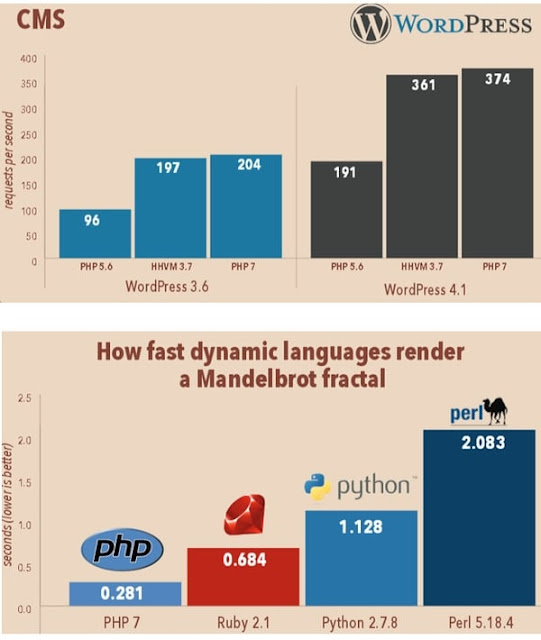Hello PHP 7!
The final version of PHP 7 was released in December 2015 (read the official announcement on php.net). PHP 7 includes with a new version of the Zend Engine. A migration guide was published and available at the PHP.net open source project website.
The PHP project has also published PHP version 7.0.12 - which fixes several security bugs. PHP 7.1 was designed to deliver a few long awaited features to PHP 7: the support of Server Push via HTTP / 2 curl and nullable types just to name a few (see the complete list of evolutions on the site of the PHP project). The performance of the language has also been significantly improved.
Download PHP 7 here
How fast is PHP 7
PHP 7 is than any of its predecessors. Performance gain is the main promise made by Zend and the main contributors to the PHP project. This new version is based on PHPNG Engine (stands for PHP Next-Generation). An initiative that was launched by Zend in response to Facebook's HHVM technology, which was intended to offer a version of PHP that wanted to perform faster.According to Zend, updating applications to PHP 7 could result in an increase in performance from 25% to 70%. The editor has published some indicators that he summarized in a computer graphics published in May 2015. These comparatives show that WordPress (version 4.1) would be twice as fast with PHP 7 as with PHP 5.6, and Drupal (7) 70 % faster.
Here are a few benchmark speed comparison between PHP 5 vs PHP 7
Data types changes in PHP 7
Return Type Declarations & Scalar Type Hints are used to declare (optionally) a return type for functions and methods.New Exception Engine for PHP 7
Finally PHP has improved method for catching exception for PHP programmers which has never been easy. The new Engine Exceptions will allow you to replace fatal and catchable errors with exceptions. If the exception is not caught, PHP will continue to return the same fatal errors as it does in the current 5.X series.The new \EngineException objects don’t extend the \Exception Base Class. This ensures backward compatibility and results in two different kinds of exceptions in error handling: traditional and engine exceptions.
To enable programmers to catch both, PHP 7 introduces a new shared Parent Class under the name of \BaseException.
